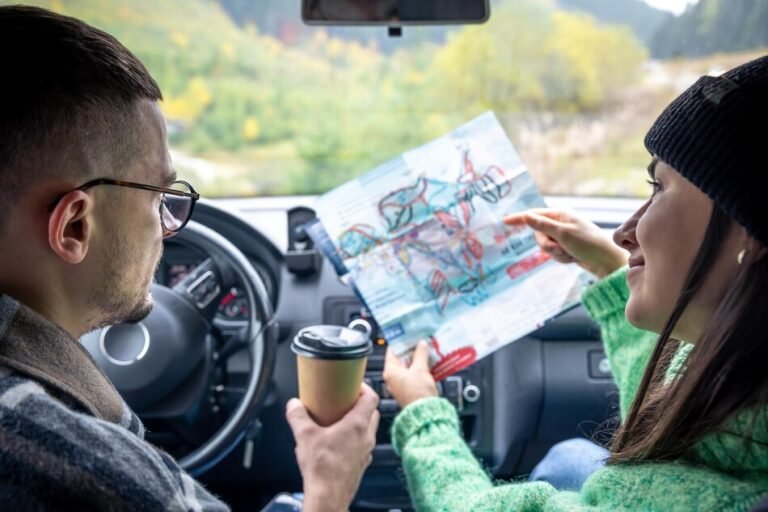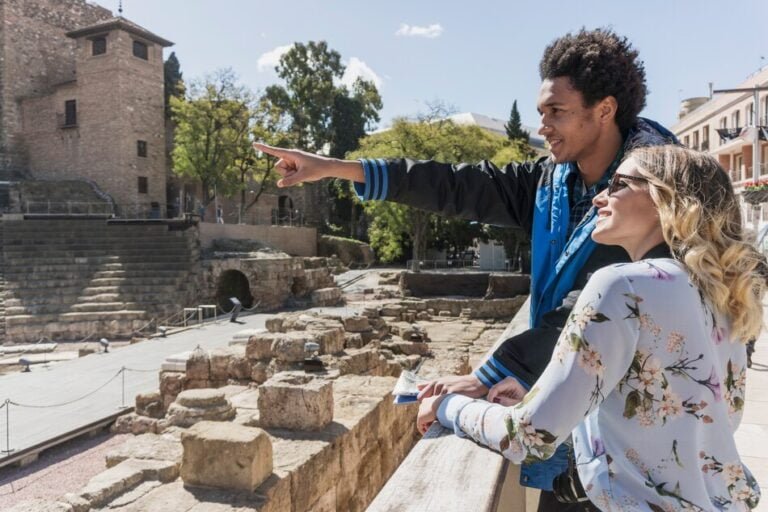Sustainable Travel Tips: How To Minimize Your Impact While Exploring The World
Sustainable travel tips has become a reasonable and moral way to see the world in a time when caring about the earth is becoming more and more critical. Travelers are now becoming more aware of how important it is to have as little of an effect on the world as possible while still enjoying its beauty.
Sustainable travel tips is more than just the latest trend; it is a promise to protect the cultural and natural history that makes travel worthwhile. This guide has valuable suggestions and tips to help you travel in a way that is good for the world and people. You’ll learn how to travel in a way that is good for the environment by staying in eco-friendly places helping local communities and offsetting your carbon footprint.
Choose Eco Friendly Accommodations
Eco friendly lodging is a significant strategy to lessen your environmental impact when traveling. Fortunately the hotel sector is adopting sustainable travel tips giving tourists several alternatives. Look for hotels, resorts and guesthouses that help local communities preserve energy and water and reduce waste. Many eco-friendly hotels utilize solar or wind power and recycle and compost to decrease trash. Instead of chain hotels stay in smaller locally owned ones with a reduced carbon impact and support the local economy.
When reserving accommodations look for LEED Green Key or Global Sustainable travel tips Council certifications or eco labels. These certificates show that the property meets environmental standards and reduces its ecological impact. Eco friendly lodgings let you relax while supporting sustainable travel.
Practice Responsible Tourism
Responsible tourism involves considering how your activities affect the areas you visit and the locals. Respecting local traditions, promoting community projects and reducing environmental impacts are included. Sustainable travel tips conduct in natural environments is crucial to responsible tourism. To minimize ecological impact follow Leave No Trace principles while hiking, camping or outdoor activities. This involves following paths disposing of rubbish and not harming animals or delicate habitats.
Buy souvenirs and eat at local eateries to support local businesses and artists. Choose small sustainable companies that support the local economy over global chains. Respect local customs and traditions and learn about their lifestyle. By interacting positively with people you may learn more about the areas you visit and contribute to the beneficial cultural exchange of travel.
Reduce Your Carbon Footprint
Traveling produces carbon emissions however you may reduce your carbon footprint and environmental impact. Instead of flying or driving, consider that trains or buses emit less. Takeoffs and landings emit the most so consider nonstop flights while traveling. In economy class increasing occupancy reduces emissions per person.
Instead of hiring a vehicle, walk , bike or use public transit to reduce fossil fuel use. When renting a car consider an electric or fuel efficient type. Carbon emissions may be compensated by participating in carbon offset programs promoting renewable energy or forestry projects. You can assess and offset your trip emissions with several airlines and travel businesses.
Read Also: Top 10 Enchanting Winter Travel Destinations Around The World
Respect Wildlife And Natural Habitats
Wildlife viewing in its natural environment is a highlight of travel. Seeing exotic birds in the jungle swimming with marine life or safariing with giant creatures may be awe inspiring and informative. However we must remember that human presence may harm species and ecosystems. Prioritize animal well being while engaging with them. Prevent disturbing or feeding them to avoid stress and disrupt their normal behavior.
Visit coral reefs, mangroves and endangered species areas with caution. Touching or standing on coral may irreparably destroy delicate ecosystems. Choose conservation and education focused wildlife interactions. Choose ethical tour companies and guides that promote wildlife protection. Respecting animals and natural habitats lets you connect with nature while protecting vulnerable ecosystems.
Pack Wisely And Minimize Waste
Travelers and the environment benefit from packing light. You generate carbon emissions and garbage by manufacturing, transporting and disposing of everything you carry. Pack what you need and use multi purpose goods to reduce your environmental effects instead of purchasing cheap throwaway gear that will wind up in a landfill choose robust high quality gear that will endure numerous journeys.
Choose eco friendly toiletry and personal care packaging to reduce plastic waste and dangerous chemicals. Find recyclable or compostable soaps, shampoos and sunscreens. Take a reused water bottle, coffee cup and shopping bag to eliminate single use plastics when traveling. Bring a reusable utensil set and food container for picnics or on the go meals. Pack sensibly and limit trash to lessen your environmental impact and inspire others.
Support Sustainable travel tips Initiatives
As passengers we can shape tourism and destination development and management. We can promote responsible travel and positive change by supporting sustainable travel tips projects and companies. Find sustainable tour operators attractions and lodgings that support local conservation and community development. Select tours that promote animal cultural or environmental education.
Consider volunteering or joining community based tourism programs that empower locals and promote sustainability. By connecting with local communities you may learn about their culture and lifestyle and help them succeed economically. Support local conservation groups, participate in eco-friendly activities and share your experiences to promote sustainable travel tips in your location. Together we can make tourism more sustainable and responsible for tourists and the earth.
Embrace Slow Travel
Slow travel is more than just taking your time when you’re visiting. It is also a way of thinking that allows you to connect more profoundly with the areas you visit. Slow travel means taking your time and experiencing the culture of the place you’re visiting rather than running from one tourist site to the next. This way of traveling helps you make memories that will last a lifetime.
One of the main ideas behind slow travel is to stay in each place for longer so you can feel the flow of everyday life. This could mean getting a vacation home or apartment house sitting for someone in the area or staying put longer than you had planned.
When you travel slowly you can find secret gems, connect with people meaningfully and learn more about the places you visit. When you travel again you should slow down and enjoy the trip as much as the goal.
Offset Your Travel Carbon Footprint
Emissions are unavoidable despite our best attempts to reduce our carbon footprint when traveling. Fortunately sponsoring greenhouse gas reduction or carbon sequestration programs may offset these emissions. Carbon offsetting includes measuring travel emissions and investing in programs that reduce equal emissions. These projects may consist of renewable energy reforestation or methane collection.
Many airlines and travel firms provide carbon offset programs that let passengers quantify and offset their emissions when booking. You may also invest in verified carbon offset projects via respected organizations like the Gold Standard or Verified Carbon Standard. Consider openness, trustworthiness and additionality guarantee that the project emissions reductions would not have happened without your support when choosing a carbon offset project. You can reduce your carbon footprint and help fight climate change by offsetting your travel carbon impact.
Conclusion
It is not just a trend to travel in a way that doesn’t harm the environment, it is our duty to protect it for future generations. We can have less of an effect on the environment while still enjoying the beauty of travel by making choices like staying in eco-friendly places, helping local communities and lowering our carbon footprint.
Respecting local traditions, animals and ecosystems is part of responsible travel as is leaving a place better than we found. When we travel slowly we can experience the cultures of the places we visit and enjoy their beauty.
We can also lessen the damage our trips do to the earth by reducing our carbon footprint. Sustainable travel tips aims to see the world more thoughtfully and responsibly. It promises to protect the planet’s beauty and variety while making experiences meaningful for tourists and locals.
FAQs
What Is Sustainable Travel?
When you travel, sustainable travel means making choices that are good for the earth so that you have less of an effect on the world.
How Can I Choose Eco Friendly Accommodations?
Check out hotels, motels and guesthouses with marks from the Global Sustainable Tourism Council LEED or Green Key. These show that they meet environmental standards.
What Is Responsible Tourism?
When you travel responsibly you think about how your actions affect the places you visit and the people who live there and you take steps to reduce the harmful effects as much as possible.
How Can I Reduce My Carbon Footprint While Traveling?
Trains and buses are better ways to get around than flying or driving. Instead of getting a car, use public transportation or walk. Consider also looking into carbon refund programs.
How Can I Respect Wildlife And Natural Habitats While Traveling?
Follow the Leave No Trace rules, don’t bother or feed wildlife and choose honest wildlife tour companies and hosts.
How Can I Minimize Waste While Traveling?
To reduce plastic trash pack light choose sturdy high quality gear and use eco friendly toiletries and personal care items.
How Can I Support Sustainable Tourism Initiatives?
Choose tours that teach about the environment, support local protection and community development projects and consider helping or joining community based tourism programs.
What Is Slow Travel?
People who travel slowly are more likely to spend more time in each place, learn about the society there and have a more authentic experience.
How Can I Offset My Travel Carbon Footprint?
Investing in programs that lower greenhouse gas pollution like renewable energy or reforestation projects can help you make up for the carbon footprint of your travels.
Why Is Sustainable Travel Essential?
That is why sustainable travel is essential. It helps protect the environment, helps local communities and keeps the beauty and culture of places for future generations.







